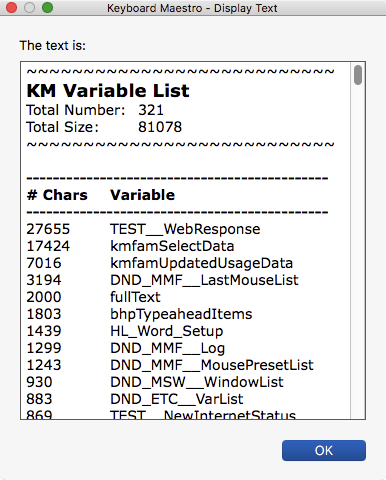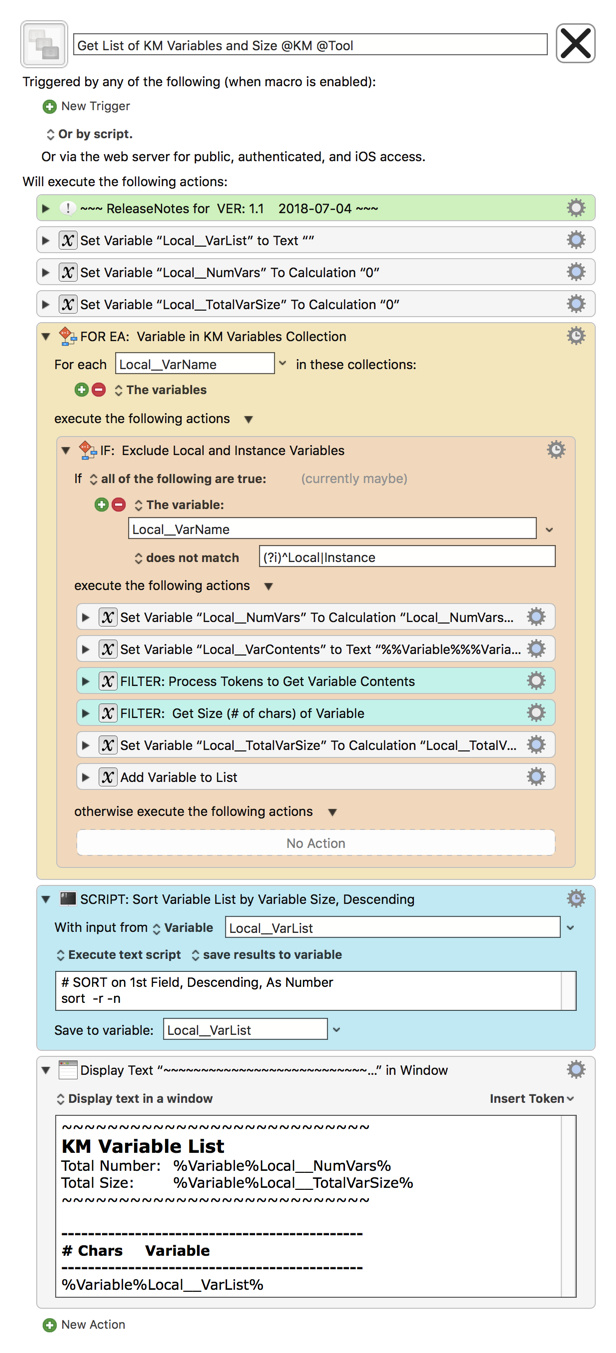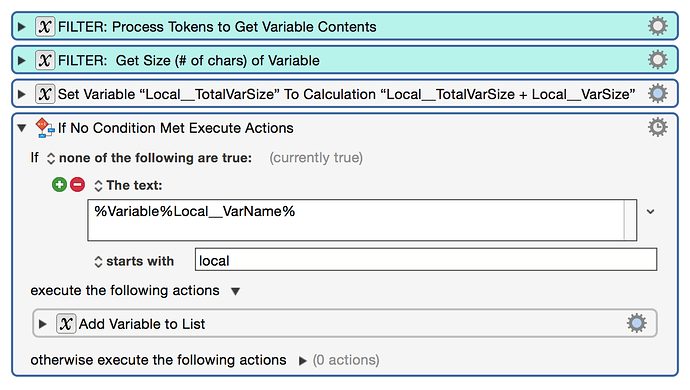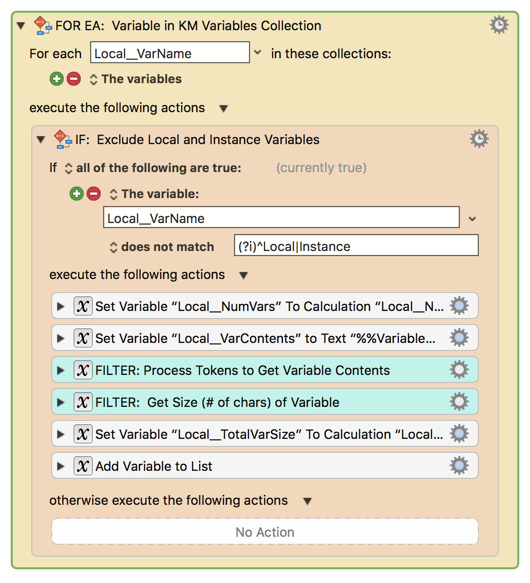Or (in Applescript):
Listing the largest Keyboard Maestro variables first, with a secondary sort by name:
use AppleScript version "2.4"
use framework "Foundation"
use scripting additions
on run
tell application "Keyboard Maestro Engine"
tell variables
set ks to name
set vs to value
end tell
end tell
-- LARGEST KM VARIABLES LISTED FIRST
-- (secondary sort by name – case-insensitive)
unlines(map(reportLine, ¬
sortOn({{snd, false}, {lowerCaseName, true}}, ¬
zip(ks, map(|length|, vs)))))
end run
-- lowerCaseName :: (String, Int) -> String
on lowerCaseName(tpl)
toLower(fst(tpl))
end lowerCaseName
-- reportLine :: (String, Int) -> String
on reportLine(kn)
fst(kn) & " :: " & snd(kn) as text
end reportLine
-- GENERIC ----------------------------------------------
-- https://github.com/RobTrew/prelude-applescript
-- Tuple (,) :: a -> b -> (a, b)
on Tuple(a, b)
{type:"Tuple", |1|:a, |2|:b, length:2}
end Tuple
-- concatMap :: (a -> [b]) -> [a] -> [b]
on concatMap(f, xs)
tell mReturn(f)
set lng to length of xs
set acc to {}
repeat with i from 1 to lng
set acc to acc & |λ|(item i of xs, i, xs)
end repeat
end tell
return acc
end concatMap
-- flatten :: NestedList a -> [a]
on flatten(t)
if list is class of t then
concatMap(my flatten, t)
else
t
end if
end flatten
-- foldr :: (a -> b -> b) -> b -> [a] -> b
on foldr(f, startValue, xs)
tell mReturn(f)
set v to startValue
set lng to length of xs
repeat with i from lng to 1 by -1
set v to |λ|(item i of xs, v, i, xs)
end repeat
return v
end tell
end foldr
-- fst :: (a, b) -> a
on fst(tpl)
if class of tpl is record then
|1| of tpl
else
item 1 of tpl
end if
end fst
-- length :: [a] -> Int
on |length|(xs)
length of xs
end |length|
-- Lift 2nd class handler function into 1st class script wrapper
-- mReturn :: First-class m => (a -> b) -> m (a -> b)
on mReturn(f)
if class of f is script then
f
else
script
property |λ| : f
end script
end if
end mReturn
-- map :: (a -> b) -> [a] -> [b]
on map(f, xs)
tell mReturn(f)
set lng to length of xs
set lst to {}
repeat with i from 1 to lng
set end of lst to |λ|(item i of xs, i, xs)
end repeat
return lst
end tell
end map
-- min :: Ord a => a -> a -> a
on min(x, y)
if y < x then
y
else
x
end if
end min
-- Sort a list by comparing the results of a key function applied to each
-- element. sortOn f is equivalent to sortBy(comparing(f), xs), but has the
-- performance advantage of only evaluating f once for each element in
-- the input list. This is called the decorate-sort-undecorate paradigm,
-- or Schwartzian transform.
-- Elements are arranged from from lowest to highest.
-- In this Applescript implementation, f can optionally be [(a -> b)]
-- or [((a -> b), Bool)]) to specify a compound sort order
-- xs: List of items to be sorted.
-- (The items can be records, lists, or simple values).
--
-- f: A single (a -> b) function (Applescript handler),
-- or a list of such functions.
-- if the argument is a list, any function can
-- optionally be followed by a bool.
-- (False -> descending sort)
--
-- (Subgrouping in the list is optional and ignored)
-- Each function (Item -> Value) in the list should
-- take an item (of the type contained by xs)
-- as its input and return a simple orderable value
-- (Number, String, or Date).
--
-- The sequence of key functions and optional
-- direction bools defines primary to N-ary sort keys.
-- sortOn :: Ord b => (a -> b) -> [a] -> [a]
-- sortOn :: Ord b => [((a -> b), Bool)] -> [a] -> [a]
on sortOn(f, xs)
script keyBool
on |λ|(x, a)
if class of x is boolean then
{asc:x, fbs:fbs of a}
else
{asc:true, fbs:({Tuple(x, asc of a)} & fbs of a)}
end if
end |λ|
end script
set {fs, bs} to {|1|, |2|} of unzip(fbs of foldr(keyBool, ¬
{asc:true, fbs:{}}, flatten({f})))
set intKeys to length of fs
set ca to current application
script dec
property gs : map(my mReturn, fs)
on |λ|(x)
set nsDct to (ca's NSMutableDictionary's ¬
dictionaryWithDictionary:{val:x})
repeat with i from 1 to intKeys
(nsDct's setValue:((item i of gs)'s |λ|(x)) ¬
forKey:(character id (96 + i)))
end repeat
nsDct as record
end |λ|
end script
script descrip
on |λ|(bool, i)
ca's NSSortDescriptor's ¬
sortDescriptorWithKey:(character id (96 + i)) ¬
ascending:bool
end |λ|
end script
script undec
on |λ|(x)
val of x
end |λ|
end script
map(undec, ((ca's NSArray's arrayWithArray:map(dec, xs))'s ¬
sortedArrayUsingDescriptors:map(descrip, bs)) as list)
end sortOn
-- snd :: (a, b) -> b
on snd(tpl)
if class of tpl is record then
|2| of tpl
else
item 2 of tpl
end if
end snd
-- toLower :: String -> String
on toLower(str)
set ca to current application
((ca's NSString's stringWithString:(str))'s ¬
lowercaseStringWithLocale:(ca's NSLocale's currentLocale())) as text
end toLower
-- unlines :: [String] -> String
on unlines(xs)
set {dlm, my text item delimiters} to ¬
{my text item delimiters, linefeed}
set str to xs as text
set my text item delimiters to dlm
str
end unlines
-- unzip :: [(a,b)] -> ([a],[b])
on unzip(xys)
set xs to {}
set ys to {}
repeat with xy in xys
set end of xs to |1| of xy
set end of ys to |2| of xy
end repeat
return Tuple(xs, ys)
end unzip
-- zip :: [a] -> [b] -> [(a, b)]
on zip(xs, ys)
set lng to min(length of xs, length of ys)
set lst to {}
repeat with i from 1 to lng
set end of lst to Tuple(item i of xs, item i of ys)
end repeat
return lst
end zip
![]() 2018-07-04 22:14 GMT-5
2018-07-04 22:14 GMT-5



